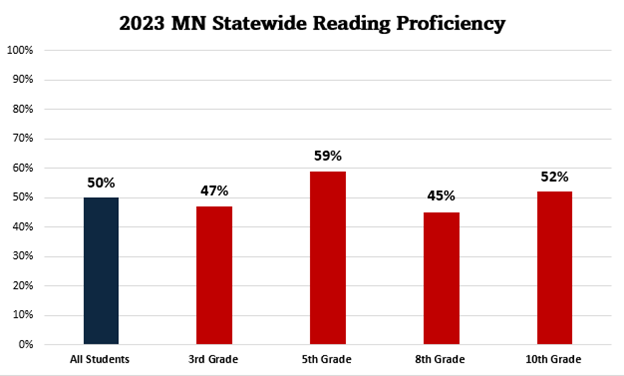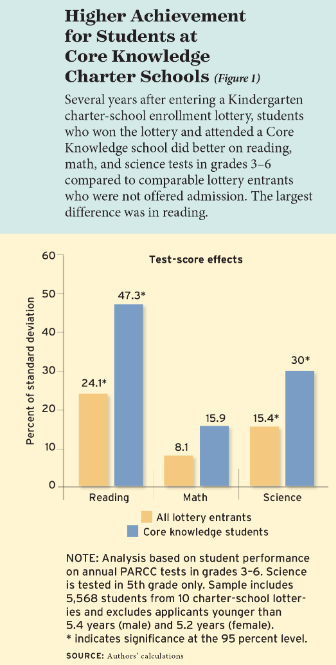If you could choose only one subject for your child to learn in school, what would that subject be?
The answer to that question is a no-brainer: reading. Why? Because reading is the key which opens the door to all other subjects. Even if a child doesn’t have a teacher in math, science, or history, learning to read well will give him the tools he needs to grow on his own in those other subjects.
Unfortunately, not all students in Minnesota schools appear to be learning this basic skill. Statewide, only half of all students meet grade level reading standards. On an individual grade level, reading proficiency tops out at 59% in 5th grade, dropping to 45% in 8th grade and 52% in 10th grade.

This follows a pattern laid out by educator E. D. Hirsch in his book, What Your Fifth Grader Needs to Know. “[F]or the vast majority of children, academic deficiencies from the first six grades permanently impair the success of later learning,” Hirsch writes. “Poor performance of American students in middle and high school can be traced directly to shortcomings inherited from elementary schools that have not imparted to children the knowledge they need for further learning.”
In other words, if the foundation is not properly laid in the early years, academic progress will peter out as the students get older.
Because of this, Hirsch advocates for students to learn what he calls “core knowledge,” providing reading materials and basic facts in math, science, literature, history, and other areas to build cultural and mental literacy in children one building block at a time. Recent research featured in Education Next shows that students attending schools which teach this “core knowledge” see higher achievement, particularly in reading, than their counterparts. [See chart below.]

Keeping this in mind, look at that statistic for Minnesota 5th grade students once more: only 59% can read proficiently. Put another way, 4 out of every 10 5th graders in Minnesota can’t read proficiently. The question is, is your child one of them?
If you’re curious about the answer to that question, then why not give one of the following three literature passages to your 5th grade student? Each one comes from Hirsch’s aforementioned book, What Your Fifth Grader Needs to Know. If your 5th grader can read them smoothly and easily at a steady pace, then congratulations, he or she is probably in the proficiency percentage!
But if not, you may want to start checking around in your child’s school, talking to administration and teachers to better understand the type of education unfolding in the classrooms. Your investigation may be life-changing for your child—and may mean the difference between a successful, well-adjusted adult, or a discouraged, floundering one.
Three Test Passages for 5th Grade Students:
The Adventures of Tom Sawyer, by Mark Twain
Tom Sawyer appeared on the sidewalk with a bucket of whitewash and a long-handled brush. He surveyed the fence, and all gladness left him and a deep melancholy settled down upon his spirit. He had been caught sneaking in late last evening, and now Aunt Polly was determined to punish him by turning his Saturday into captivity at hard labor, whitewashing a fence. Thirty yards of board fence nine feet high. Sighing he dipped his brush and passed it along the topmost plank; repeated the operation; did it again; compared the insignificant whitewashed streak with the far-reaching continent of the unwhitewashed fence, and sat down discouraged.
Soon the free boys would come tripping along on all sorts of delicious expeditions, and they would make a world of fun of him for having to work—the very thought of it burnt him like fire. At this dark and hopeless moment an inspiration burst upon him! He took up his brush and went tranquilly to work.
Adventures of Sherlock Holmes: The Red-Headed League, by Arthur Conan Doyle
What a sight! From every direction tramped every man who had a shade of red in his hair. Orange red. Brick red. Irish setter red. When I saw the crowd, I would have given up, but Spaulding pushed me right up the steps and into the office. Behind a table sat a small man with a head even redder than mine. He managed to find some fault to disqualify each candidate that went before us, but when our turn came, he closed the door, looked me over, then suddenly plunged forward and shook my hand in congratulations. He explained that he was Mr. Duncan Ross, a member of the League himself. ‘When shall you be able to begin your duties?’ he asked. ‘What would be the hours?’ I asked. ‘Ten to two.’ Now a pawnbroker’s business is mostly done of an evening, Mr. Holmes, so it would suit me very well to earn a little in the mornings. He told me that the job required that I stay in the office the entire time each day, and that I would forfeit my position if I left for any reason. The work was to copy out the Encyclopedia Britannica.
The Iliad, by Homer
Paris was one of the sons of Priam and Hecuba, king and queen of the high-walled city of Troy. Shortly before Paris was born, Hecuba dreamed that her next child would bring ruin upon his family and native city. So, when the baby was born, the king ordered a shepherd to take the infant to Mount Ida and leave it to die. Reluctantly, the shepherd took the baby and left him. When the shepherd returned a few days later, he found the baby alive and well. He took the baby to his home and raised the boy, whom he named Paris, as one of his own family.
Paris grew up strong, handsome, and athletically skilled. He did not know he was really King Priam’s son. He was happy as a young shepherd, and he happily married a lovely nymph who was the daughter of a river god. But this happiness was not to last, for soon Paris would get involved in a quarrel among three goddesses.
—
Image Credit: Pexels












![[downloaded during free trial]](https://oakmn.org/wp-content/uploads/2025/11/iStock-1430368205-120x86.jpg)
